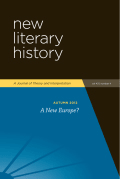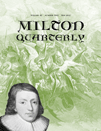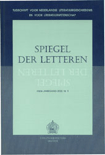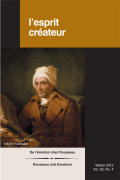
NEW LITERARY HISTORY
Scope & Guideline
Fostering Innovative Theories in Literary History
Introduction
Aims and Scopes
- Interdisciplinary Literary Criticism:
The journal engages with various critical theories and methodologies, including formalism, psychoanalysis, and post-critique, to analyze literary texts and their broader implications. - Ethics and Literature:
A significant area of focus is the ethical dimensions of literature, examining how narratives engage with moral philosophy and social issues. - Cultural and Historical Contexts:
NEW LITERARY HISTORY emphasizes the importance of historical context in literary analysis, often exploring how literature reflects and critiques societal norms and historical events. - Emerging Technologies and Literature:
The journal investigates the impact of technology on literary production and consumption, including themes like cybernetics, digital humanities, and the role of computational methods in literary studies. - Polymathy and Intellectual History:
The exploration of polymathic figures and the interrelation between various fields of knowledge is a recurring theme, highlighting how these connections inform literary discourse.
Trending and Emerging
- Cybernetics and Digital Humanities:
A growing trend is the exploration of cybernetic theory and digital methodologies, emphasizing how technology reshapes literary analysis and the reading experience. - Queer Theory and Race Studies:
Recent publications highlight the intersection of queer theory with race studies, reflecting an increasing focus on identity politics and marginalized voices in literature. - Ethics in Literature:
The ethical implications of literary narratives are increasingly scrutinized, particularly in relation to contemporary issues such as trauma, colonialism, and social justice. - Climate Fiction and Environmental Narratives:
There is an emerging interest in climate fiction and the ways literature can engage with ecological concerns, reflecting a growing awareness of environmental crises. - Polymathy and Interdisciplinary Approaches:
The journal is witnessing a resurgence in the exploration of polymathy, connecting literature with various fields such as science, philosophy, and cultural studies, fostering a richer intellectual discourse.
Declining or Waning
- Traditional Historical Narratives:
There appears to be a waning interest in conventional historical literary studies that do not incorporate contemporary theoretical frameworks or interdisciplinary approaches. - Singular Author Studies:
Research centered on individual authors without engaging in broader cultural or theoretical contexts is becoming less prominent, as the journal increasingly favors collective or thematic explorations. - Static Literary Forms:
The examination of fixed literary forms, such as traditional poetry or prose without consideration of their evolving contexts or technological influences, is less frequently addressed. - Canonical Texts in Isolation:
There is a noticeable reduction in analyses that focus solely on canonical texts without placing them within a larger socio-political or ethical discourse.
Similar Journals

MILTON QUARTERLY
Engaging Minds Through Milton's LegacyMILTON QUARTERLY, published by Wiley, is a premier academic journal in the field of Literature and Literary Theory. Since its inception in 1967, it has become a leading platform for scholarly discourse, focusing on the works and influence of John Milton and extending to broader themes in literary studies. With an impressive Q1 ranking in its category, the journal is recognized for its high-quality peer-reviewed articles and contribution to advancing literary scholarship. Although it currently does not offer open access options, its impact in the academic community is undeniable, boasting publications that resonate well beyond its pages. The journal is an invaluable resource for researchers, professionals, and students alike, keen on exploring the intersections of literary theory, history, and criticism, making significant contributions to the understanding of literature throughout the centuries.

RIVISTA DI LETTERATURE MODERNE E COMPARATE
Bridging Cultures Through Literary AnalysisRIVISTA DI LETTERATURE MODERNE E COMPARATE is a distinguished academic journal published by PACINI EDITORE in Italy, dedicated to the exploration of modern and comparative literature. With an ISSN of 0391-2108, this journal serves as an essential resource for scholars and practitioners engaged in the ever-evolving fields of literature and literary theory. Although the journal currently falls into the Q4 quartile category for 2023, it aims to foster a rich dialogue among researchers, practitioners, and students by publishing innovative and diverse perspectives on contemporary literary issues. The journal is indexed in Scopus, ranking #1045 out of 1106 in the subject area, indicating a niche, yet critical contribution to the literature landscape. Covering converged years from 2002 to 2013 and 2017 to 2024, RIVISTA DI LETTERATURE MODERNE E COMPARATE is vital for those looking to delve deeper into literary analytic methodology and comparative studies, providing an avenue for both new research and established discourse.

AUSTRALIAN LITERARY STUDIES
Navigating the Rich Tapestry of Australian Literary ExpressionAUSTRALIAN LITERARY STUDIES, published by The University of Queensland, is a prominent journal in the field of literary studies dedicated to promoting discourse and scholarship in Australian literature. With an ISSN of 0004-9697 and E-ISSN 1837-6479, the journal provides a rigorous platform for researchers and academics to explore the rich tapestry of literary expression within Australia, from historical contexts to contemporary practices. Although not an open-access journal, it plays a vital role in advancing critical analysis, theory, and methodological innovation, as evidenced by its Q3 categorization in Literature and Literary Theory and its Scopus ranking of #459 out of 1106 journals in the Arts and Humanities sector, positioning it in the 58th percentile. The journal covers a diverse range of topics, making it an essential resource for scholars and students who seek to understand and contribute to the ongoing conversation around literary culture in Australia. Converging years from 2002 to 2024, AUSTRALIAN LITERARY STUDIES continues to be a pivotal publication leading the way in Australian literary scholarship.

SPIEGEL DER LETTEREN
Fostering Insightful Dialogues in Literary StudiesWelcome to SPIEGEL DER LETTEREN, a distinguished journal published by PEETERS in Belgium, with an impressive Q1 ranking in Literature and Literary Theory. Since its inception in 1996, this journal has been at the forefront of literary scholarship, engaging researchers, professionals, and students in profound discussions and analysis of literary texts, theories, and cultural contexts. Although it does not currently offer open access, its rigorous editorial standards ensure that each published work contributes significantly to the field, promoting the advancement of knowledge and understanding in literature. With an established reputation, SPIEGEL DER LETTEREN serves as a vital resource for those seeking to explore the nuances of literary studies, supported by a diverse range of articles that reflect both contemporary and historical perspectives.

Anales de Literatura Hispanoamericana
Illuminating the Path of Hispanic Literary ExplorationAnales de Literatura Hispanoamericana, published by UNIV COMPLUTENSE MADRID, SERVICIO PUBLICACIONES, is a prominent journal dedicated to the field of Hispanic literature and literary theory. With a history of publication spanning from 1996 to 2023, this journal provides an essential platform for scholars and researchers exploring diverse aspects of literature within the Hispanic cultural context. Though it currently operates without an open-access model, its scholarly contributions are vital for advancing the understanding of literary phenomena in Spanish-speaking countries. As a Q3 ranked journal in the Literature and Literary Theory category, it engages a global audience interested in high-quality research, and its Scopus ranking places it among the notable publications in the arts and humanities. The journal aims to foster interdisciplinary dialogue, showcasing innovative research and critical analyses that enhance the appreciation of Hispanic literary heritage. Whether you are a seasoned researcher or an emerging scholar, Anales de Literatura Hispanoamericana serves as a crucial resource for advancing your understanding of the rich tapestry of Hispanic literature.

World Literature Studies
Illuminating the Rich Tapestry of World LiteratureWorld Literature Studies is a leading academic journal published by the Institute of World Literature at the Slovak Academy of Sciences, dedicated to advancing the field of literary studies. With an ISSN of 1337-9275 and an E-ISSN of 1337-9690, this journal has established itself as a prominent platform for scholarly research and discourse, earning a prestigious Q1 ranking in the Literature and Literary Theory category as of 2023, placing it in the top 25% of journals in its field according to Scopus metrics. Operating from Slovakia, the journal caters to a global audience, highlighting diverse perspectives in world literature and fostering interdisciplinary collaboration. Though it currently offers no Open Access option, it maintains a rigorous peer-review process that ensures the quality and integrity of published works. Researchers, students, and literary professionals alike will find the journal's comprehensive articles and critical analyses essential for staying informed about the latest developments and trends in literature and literary theory.

ItinerArios-Revista de Literatura
Advancing Scholarship in Literary TraditionsItinerArios-Revista de Literatura is a distinguished academic journal published by Universidade Estadual Paulista (UNESP), located in the vibrant city of Araraquara, Brazil. With a commitment to exploring the depths of literary analysis and theory, this journal serves as a crucial platform for scholars, researchers, and students to disseminate their work in the field of literature. Though the journal does not currently offer open access, it boasts a comprehensive focus on various literary traditions, critical interpretations, and emerging trends within the literary landscape. The ISSN for the print edition is 0103-815X, ensuring its recognition in the academic community. By providing a valuable forum for innovative research and engaging discussions, ItinerArios plays an essential role in enriching the discourse in the realm of literary studies, appealing to professionals and enthusiasts alike who are eager to contribute to and engage with contemporary literary scholarship.

ESPRIT CREATEUR
Redefining Boundaries in Literary AnalysisESPRIT CREATEUR is a prestigious journal published by the Johns Hopkins University Press, renowned for its contributions to the fields of Literature and Literary Theory. Since its inception in 2002, the journal has become a vital platform for innovative scholarly discourse, achieving an impressive Q2 classification in the 2023 category rankings and a respectable rank of #546 out of 1106 in the Scopus Arts and Humanities - Literature and Literary Theory sector, situating it within the 50th percentile of the discipline. The journal's blend of critical perspectives offers readers insights into contemporary literary analysis and theory, making it essential for researchers, professionals, and students alike. Though it currently adheres to traditional access models, its commitment to fostering high-quality, peer-reviewed scholarship cements its status as a leading voice in literary studies, enhancing its role in academic research and education.

Enthymema-International Journal of Literary Criticism Literary Theory and Philosophy of Literature
Fostering Innovative Discourse in Literary StudiesEnthymema - International Journal of Literary Criticism, Literary Theory and Philosophy of Literature, published by Milano University Press, is a leading open-access platform dedicated to the dynamic fields of literary criticism and theory as well as the philosophy surrounding literature. With an ISSN of 2037-2426, this esteemed journal has been fostering scholarly dialogue and innovative discourse since its inception in 2009. As a member of the prestigious Q2 quartile in the Literature and Literary Theory category as of 2023, Enthymema ranks favorably within the Scopus framework, currently positioned at #599 out of 1106 journals, reflecting a robust engagement with current academic trends. The journal emphasizes inclusivity and accessibility, ensuring that cutting-edge research and critical insights are available to a wider audience without financial barriers. With its significant focus on contemporary debates and theoretical advancements, Enthymema serves as an essential resource for researchers, professionals, and students eager to navigate the intricate landscapes of literary studies.

CESKA LITERATURA
Exploring the Depths of Czech Literary HeritageCESKA LITERATURA is a prestigious peer-reviewed journal dedicated to the exploration and analysis of Czech literature and its role within the broader spectrum of literary theory. Published by the Czech Academy of Sciences, Institute of Czech Literature, this journal has established itself as a vital resource for scholars and practitioners in the field since its inception. With an impact factor that reflects its influence, CESKA LITERATURA provides open access content since 2021, ensuring wider dissemination and accessibility of research findings. The journal aims to foster interdisciplinary dialogue and engage with contemporary literary discourse while covering a range of topics from historical studies to modern literary critiques. With a proud heritage from 2002 to 2024, CESKA LITERATURA holds a notable position, categorized in the Q3 quartile in Literature and Literary Theory for 2023, and ranked #458 out of 1106 in the Scopus database, highlighting its relevance and contribution to the arts and humanities domain. Scholars and students interested in deepening their understanding of Czech literature and contributing to its ongoing discussion are encouraged to explore the rich array of articles and insights available in this important publication.